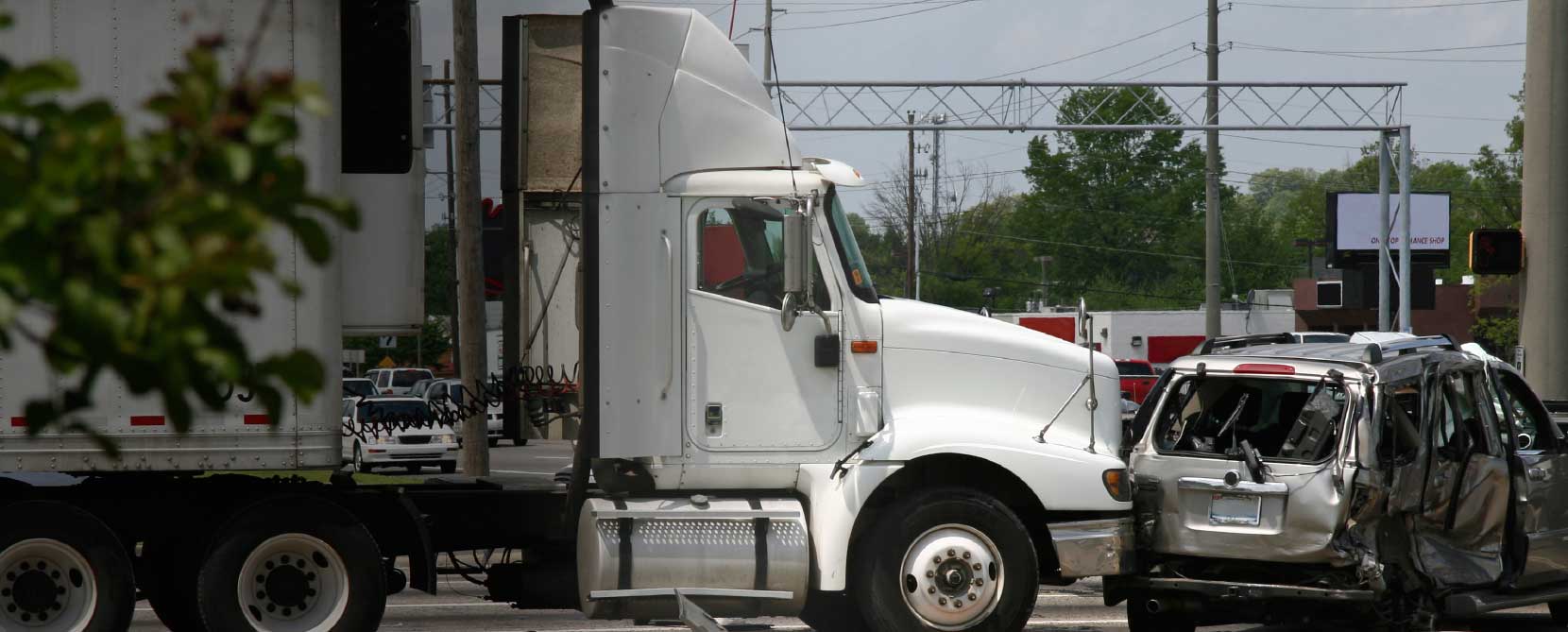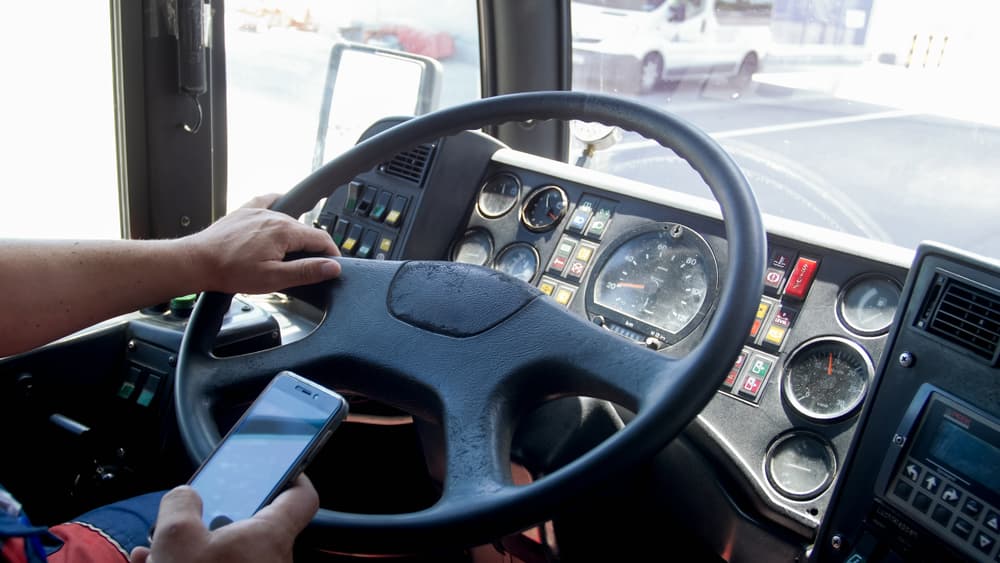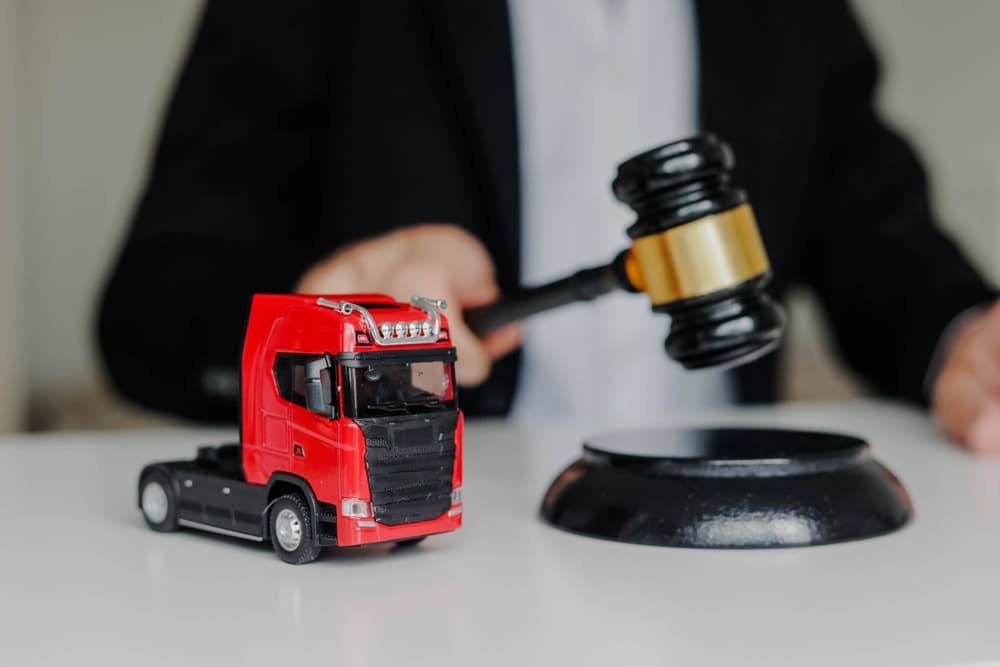Riddle & Riddle Injury Lawyers | December 12, 2024 | Trucking Accident

Truck accidents often leave a devastating impact, resulting in severe injuries, extensive property damage, and significant emotional and financial distress. Unlike typical car accidents, where liability is often easier to determine, truck accident cases involve various factors that add complexity. Determining liability in these cases is imperative, as it directly influences a victim’s ability to secure compensation for their injuries and losses. Multiple parties may share responsibility, including the truck driver, the trucking company, the truck or parts manufacturers, and third-party contractors involved in maintenance or loading. Each party’s role, degree of negligence, and compliance with federal and state regulations can impact liability.
Seeking legal counsel from an experienced Raleigh truck accident attorney is critical for navigating these complexities. Such attorneys identify liable parties, collect evidence, and advocate for fair compensation. With their assistance, accident victims are better equipped to understand their rights and receive the compensation they deserve.
Assessing the Truck Driver’s Liability: When Operator Negligence Causes Harm

The truck driver is often the first person considered when examining potential liability in a truck accident. Truck drivers are required to drive safely and in compliance with both traffic laws and Federal Motor Carrier Safety Administration (FMCSA) regulations. Truck drivers may be liable for damages when they neglect their responsibilities or engage in dangerous behavior. This liability is rooted in the concept of negligence, meaning that if a driver’s failure to meet safety standards directly contributes to an accident, they can be held accountable.
Common Forms of Driver Negligence
Truck driver negligence can take many forms, including:
Distracted Driving

Truck drivers often spend long hours on the road, and boredom or fatigue can lead to distraction. Common distractions include texting, talking on the phone, using GPS, or eating while driving. Due to the size and weight of commercial trucks, even a momentary lapse in attention can result in catastrophic accidents.
Fatigued Driving
Fatigue is a significant contributor to truck accidents. The FMCSA enforces Hours of Service (HOS) regulations to limit how long a driver can work before taking mandatory rest breaks. However, some drivers need to pay more attention to these regulations, often due to pressure from employers to meet tight deadlines.
Speeding or Aggressive Driving
Speeding and reckless driving are hazardous, especially for large vehicles that require greater stopping distances. Aggressive behavior, such as tailgating or erratic lane changes, endangers other road users.
Driving Under the Influence
Drugs, alcohol, or even certain medications can impair a truck driver’s ability to react and make safe decisions, leading to severe accidents.
Violation of Traffic Laws
Running stop signs, failing to yield, or making improper lane changes are common violations that can contribute to accidents.
When it’s clear that a truck driver’s actions caused the accident, they may be held liable. However, truck drivers often lack sufficient personal funds or insurance to cover the extensive damages associated with truck accidents. For this reason, victims may also pursue compensation from the trucking company, which may be jointly liable.
Trucking Company Liability: How Company Policies and Practices Affect Safety
Trucking companies have a legal duty to ensure that their operations meet safety standards and comply with federal and state regulations. They are responsible for vetting their drivers, maintaining their vehicles, and following guidelines that prevent accidents. When companies neglect these responsibilities, they may be held liable for accidents involving their trucks. This concept of liability is known as “vicarious liability,” where an employer may be held responsible for the actions of its employees if the employee was performing job-related tasks at the time of the accident.
Ways Trucking Companies May Be Liable

Here are several ways trucking companies can contribute to an accident:
- Negligent Hiring Practices: Trucking companies must thoroughly vet potential drivers, ensuring they have a clean driving record, the necessary qualifications, and no history of reckless driving or substance abuse. Failing to perform proper background checks can result in unsafe drivers being hired.
- Inadequate Training or Supervision: Driving a commercial truck requires specialized skills, and companies must provide comprehensive training, particularly for new drivers. Insufficient training or lack of supervision can lead to improper vehicle handling and increased accident risks.
- Improper Vehicle Maintenance: Trucking companies are required to maintain their vehicles, performing regular inspections and repairs to ensure safety. Ignoring maintenance schedules or cutting corners to save costs can lead to mechanical failures, such as brake or tire malfunctions, which increase the likelihood of accidents.
- Violations of Hours of Service (HOS) Regulations: Some companies pressure drivers to work beyond legally permitted hours to meet delivery deadlines. This can lead to fatigued driving, significantly increasing the risk of accidents.
- Unrealistic Delivery Expectations: Some companies set delivery schedules that encourage unsafe driving practices, such as speeding, by imposing unrealistic deadlines on drivers.
A truck accident attorney can determine whether a trucking company caused the accident by investigating its policies, practices, and compliance with safety regulations. When company negligence is established, the victim may seek compensation from the company, potentially increasing the chances of obtaining a fair settlement.
Manufacturer Liability: Holding the Maker Accountable for Defective Parts
In some cases, the cause of a truck accident may be traced back to faulty parts or mechanical failure. When truck accidents are caused by a defect in the vehicle itself or its components, the manufacturer of the truck or parts can be held liable. This area of law, known as product liability, enables victims to pursue compensation when a defective product directly contributes to an accident.
Examples of Manufacturer-Related Issues
- Faulty Brakes, Tires, or Steering Systems: Commercial trucks rely on high-quality, durable parts to function safely. The manufacturer may bear responsibility when a defect in any essential part causes a malfunction.
- Design Flaws: Some trucks may have design flaws that make them more susceptible to tipping, especially when carrying heavy loads. The manufacturer might be held accountable if a design defect contributed to an accident.
- Improper Maintenance or Repair of Parts: The manufacturer or distributor may share liability if a part fails due to poor quality control or incorrect installation.
Third-Party Liability: Examining the Role of Additional Entities
In some truck accident cases, additional third-party entities may be partly liable. These entities might include maintenance companies responsible for repairs, loading companies that improperly secure cargo, or even government entities if road conditions contributed to the accident.
Examples of Potential Third-Party Liability
- Maintenance Companies: Some trucking companies contract maintenance out to third-party providers. If maintenance is not performed to standard and a mechanical failure occurs, these third parties may be held liable.
- Loading and Cargo Companies: Improperly loaded or unbalanced cargo can cause a truck to tip or swerve, creating a hazardous situation. If freight shifting causes an accident, the loading company may be partly responsible.
- Government Bodies: In some cases, poor road conditions, inadequate signage, or poorly designed roads can cause an accident. When this occurs, the government agency responsible for maintaining the road may share liability.
The Importance of Federal and State Regulations in Determining Trucking Liability

The FMCSA and state agencies impose strict regulations on the trucking industry to promote safety and reduce accidents. These regulations cover various aspects of trucking operations, from driving hours and vehicle maintenance to driver qualifications and weight limits.
Key Trucking Regulations and Their Legal Implications
- Hours-of-Service (HOS) Regulations: These regulations limit the number of hours a driver can operate without taking a break, helping to prevent accidents caused by driver fatigue.
- Mandatory Vehicle Inspections and Maintenance: Trucking companies are required to perform regular inspections and maintenance to ensure their vehicles are safe for the road. Failing to comply with these standards can lead to mechanical issues that increase accident risk.
- Cargo Weight and Securement Standards: Trucks must adhere to weight limits and secure cargo properly. Failure to follow these rules can result in cargo shifts that affect vehicle stability and control.
- Driver Qualification Standards: Truck drivers must meet specific qualifications, including obtaining a Commercial Driver’s License (CDL) and undergoing medical exams to prove physical fitness.
Violations of these regulations can serve as evidence of negligence, strengthening a victim’s case against the responsible party.
Types of Truck Accidents and How They Impact Liability
Truck accidents occur in many ways, and each type can present different challenges in proving liability.
- Rear-End Collisions: When a truck rear-ends a smaller vehicle, it’s often due to speeding, distraction, or failure to maintain a safe distance. These accidents can cause severe injuries and typically implicate the truck driver.
- Jackknife Accidents: Jackknifing occurs when a truck’s trailer swings out, resembling a folded knife. This can happen if the driver loses control, often leading to multi-vehicle collisions and significant injuries.
- Rollover Accidents: Rollovers may result from high speeds, improper cargo loading, or sharp turns, often implicating the trucking company or cargo loaders.
- Underride Accidents: These happen when a smaller vehicle collides with the side or rear of a truck and becomes wedged underneath. If underride guards are absent or defective, the manufacturer may be liable.
Common Truck Accident Injuries
Truck accidents can result in severe injuries, leaving victims with long-lasting physical and emotional effects. Here are some of the most common injuries sustained in truck accidents:
- Whiplash: The sudden impact of a truck colliding with another vehicle can cause the head and neck to jerk forward and backward, resulting in whiplash. This can lead to neck pain, headaches, and reduced mobility.
- Spinal Cord Injuries: The force of a truck accident can cause damage to the spinal cord, leading to paralysis or loss of sensation in different parts of the body. These types of injuries often require extensive medical treatment and long-term care.
- Traumatic Brain Injuries: The head trauma from a truck accident can result in traumatic brain injuries (TBIs) that range from mild concussions to severe brain damage. TBIs can have long-term cognitive, emotional, and physical consequences.
- Broken Bones: The impact of a truck accident can cause bone fractures, often in the arms, legs, ribs, or pelvis. These fractures can be painful and may require surgery or prolonged immobilization.
- Internal Injuries: The force of a truck accident can cause internal injuries such as organ damage, internal bleeding, and damage to the abdomen or chest. These injuries may be complex to detect immediately and can be life-threatening.
- Burns: Truck accidents can result in fires or explosions, causing severe burns to the victims. Burn injuries can lead to long-term physical and emotional scarring, requiring extensive medical treatment and rehabilitation.
If you or a loved one has suffered any of these injuries in a truck accident, it is in your best interest to consult with a truck accident lawyer who can help seek the compensation you need for medical expenses, lost earnings, and pain and suffering.
The Role of a Truck Accident Attorney in Securing Fair Compensation

Truck accident attorneys play an integral role in helping victims secure the compensation they deserve. A knowledgeable truck accident attorney can make a significant difference in achieving fair compensation. Here are key ways an attorney can support victims:
- Gathering Evidence to Prove Liability: An attorney will collect evidence, including accident reports, witness statements, and data from the truck’s event recorder, to build a strong case.
- Calculating Damages: Truck accidents often lead to extensive medical bills, lost earnings, and non-economic damages such as pain and suffering. An attorney will assess all damages to pursue comprehensive compensation.
- Negotiating with Insurance Companies: Attorneys handle negotiations with insurance providers, who may try to minimize payouts. With legal representation, victims are more likely to secure fair compensation.
- Guiding Clients Through Legal Processes: Filing claims, meeting deadlines, and handling court procedures can be overwhelming. An experienced attorney manages these tasks, allowing clients to focus on recovery.
- Representing Clients in Settlement Negotiations or Court: If a fair settlement cannot be reached, an attorney will prepare the case for trial, advocating for the victim’s rights before a judge or jury.
Injured in a Truck Accident? Contact a Skilled Truck Accident Attorney Today
Determining liability in truck accidents is a complex process that often involves multiple parties and extensive investigation. For those affected by truck accidents, seeking representation from an experienced truck accident attorney is essential. An personal injury lawyer’s knowledge of industry regulations, ability to identify liable parties, and experience handling insurance negotiations can significantly increase the likelihood of securing fair compensation.
Truck accident cases are typically handled on a contingency fee basis, meaning victims pay no upfront costs, and the attorney is only paid if compensation is awarded. With a free consultation, individuals can discuss the specifics of their case, understand their legal options, and make informed decisions about pursuing justice.
If you or a loved one has suffered an injury in a truck accident, don’t hesitate to contact a qualified personal injury lawyer today. By partnering with an experienced truck accident lawyer, you can ensure your rights are protected, and you have the best opportunity to obtain the compensation needed to recover and rebuild your life.
Contact a Personal Injury Lawyer from Riddle & Riddle Injury Lawyers for Help Today
For more information, please contact Riddle & Riddle Injury Lawyers to schedule a free consultation with a personal injury lawyer in North Carolina today. We have twelve convenient locations in North Carolina, including Greenville, Raleigh, Goldsboro, Jacksonville, Kinston, Charlotte, Greensboro, Durham, Fayetteville, Wilmington, Winston-Salem & Garner.
Riddle & Riddle Injury Lawyers – Raleigh Office
4600 Marriott Dr STE 500, Raleigh, NC 27612
(919) 876-3020
Riddle & Riddle Injury Lawyers – Charlotte Office
1914 J N Pease Pl Suite 142, Charlotte, NC 28262
(704) 486-5824
Riddle & Riddle Injury Lawyers – Durham Office
100 E Parrish St STE 200, Durham, NC 27701
(919) 728-1770
Riddle & Riddle Injury Lawyers – Garner Office
500 Benson Rd Suite 111, Garner, NC 27529
(800) 525-7111
Riddle & Riddle Injury Lawyers – Greensboro Office
7B Corporate Center Ct Suite 15, Greensboro, NC 27408
(336) 516-9066
Riddle & Riddle Injury Lawyers – Greenville Office
300 E Arlington Blvd Suite 2A #110, Greenville, NC 27858
(252) 397-8620
Riddle & Riddle Injury Lawyers – Goldsboro Office
601 N Spence Ave, Goldsboro, NC 27534
(919) 778-9700
Riddle & Riddle Injury Lawyers – Jacksonville Office
3391 Henderson Dr, Jacksonville, NC 28546
(910) 455-5599
Riddle & Riddle Injury Lawyers – Kinston Office
807 N Queen St, Kinston, NC 28501
(252) 397-8624
Riddle & Riddle Injury Lawyers – Fayetteville Office
2517 Raeford Rd, Fayetteville, NC 28305
(910) 387-9186
Riddle & Riddle Injury Lawyers – Wilmington Office
1608 Queen St Suite 12, Wilmington, NC 28401
(910) 889-4064
Riddle & Riddle Injury Lawyers – Winston-Salem Office
102 W 3rd St, Ste 1007, Winston-Salem, NC 27101
(336) 516-9042
